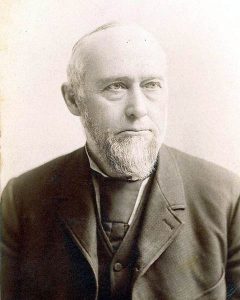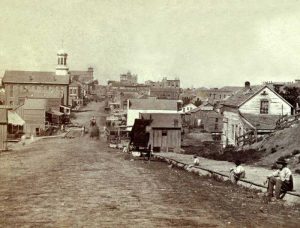Thomas Carney was the second governor of the State of Kansas.
He was born in Delaware County, Ohio, on August 20, 1824. His father, James Carney, died in 1828, leaving a widow and four small sons. Thomas remained with his mother until he was 19 years old and frequently hauled the products of their little farm with an ox team to Newark, some 36 miles distant. When he was 19, he left home with about $3.50 in his pocket and went to an uncle, Elijah Carney, in Berkshire, Ohio, where he stayed for several months, working for his board and attending school.
In the fall of 1844, he found employment with a retail dry-goods concern in Columbus before taking a position with a wholesale dry-goods house in Cincinnati. He was later admitted as a partner to the business, and the firm of Carney, Swift & Co. became one of the best-known dry-goods houses in the country. After some 12 years in Cincinnati, his health began to deteriorate, and in 1857, he visited the West in search of a new location.
In the spring of 1858, he opened the first wholesale house in Leavenworth, Kansas, with a partner named Thomas C. Stevens. Carney soon took an active interest in public affairs and, in 1861, was elected to the second State Legislature. That same year, he married Rebecca Ann Cannady in Kenton, Ohio, on November 13, 1861.
His record in the legislature soon earned him the nomination for governor in the fall of 1862. Winning the vote, he took office in January 1863. Due to his untiring efforts, several educational and charitable institutions were established during his tenure. At the close of his term as governor, he resumed his business operation. In 1886, his partner, Stevens, retired, and Carney took on different partners for several years until he became the sole proprietor.
In 1865-66, he was mayor of the city of Leavenworth and later was one of the founders of the First National Bank and became a director of the Kansas City, Lawrence & Fort Gibson Railroad. In addition to these businesses, he became interested in Colorado mining ventures. He retired from business in 1875.
Carney died on July 28, 1888, from apoplexy. At the time of his election to the governor’s office, he was a wealthy man. However, in later years, financial reverses came — due, it is said, to the unworthy schemes of designing politicians — and he died comparatively poor.
Compiled and edited by Kathy Alexander/Legends of Kansas, updated December 2024.
Also See:
Sources:
Blackmar, Frank W.; Kansas: A Cyclopedia of State History, Vol I; Standard Publishing Company, Chicago, IL 1912.
National Governors Association
Wikipedia


